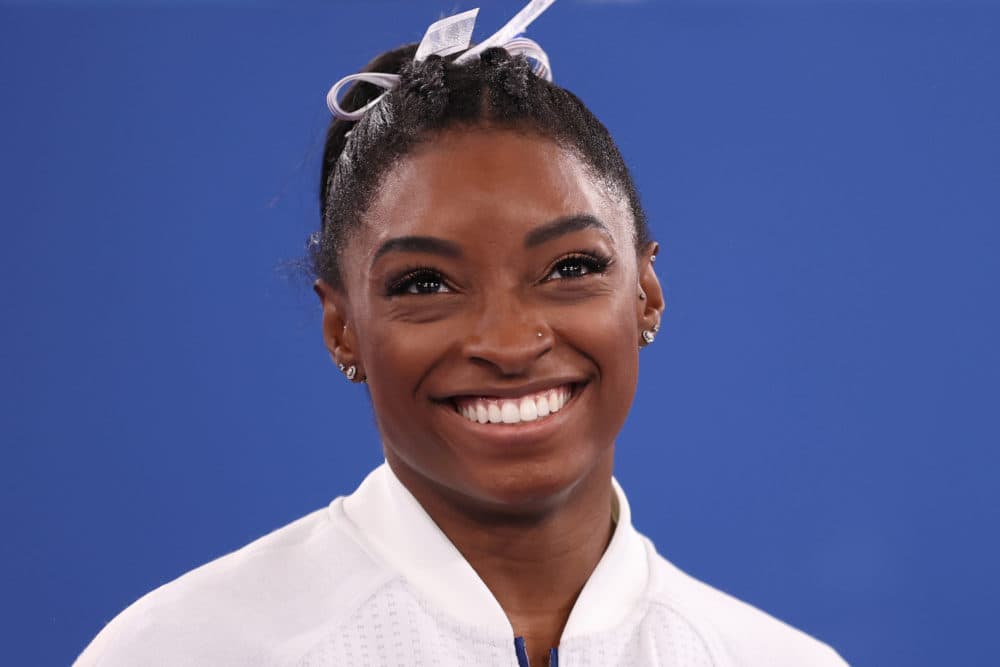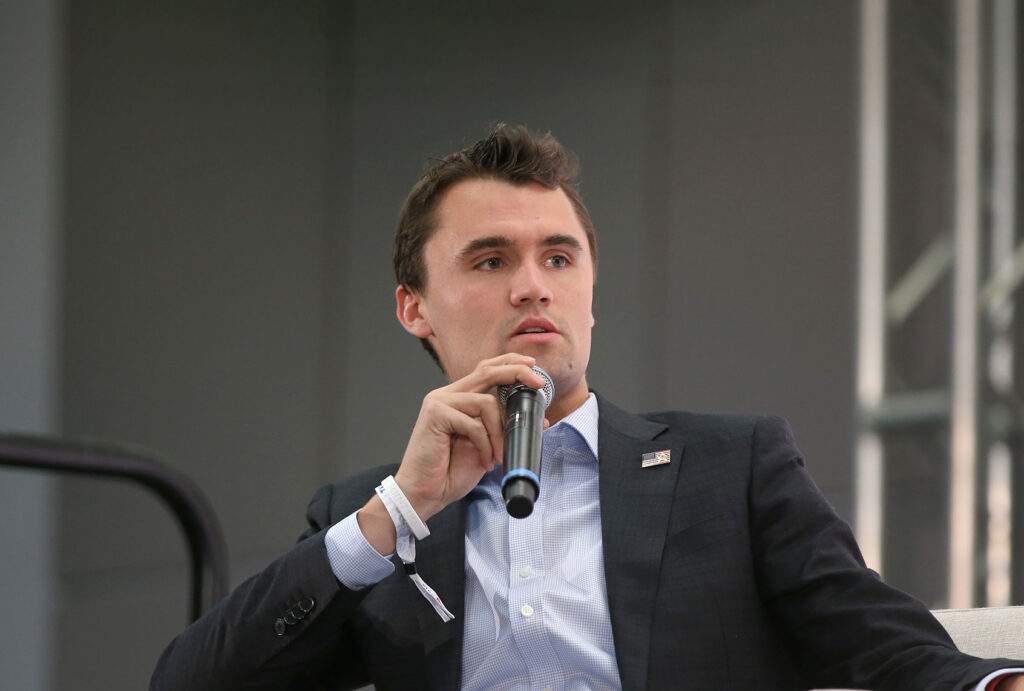She didn’t fly through the air or twist on the bar — she walked away. When Simone Biles chose herself over a gold medal in Tokyo, America was split in two. Charlie Kirk called her out, millions called her a symbol — but days later, in an emotional conversation, she finally revealed what she had never said before. And the nine words she spoke that day in Tokyo now bring even her critics to tears.
It wasn’t the flip that made history.
It wasn’t the vault, the spin, or the beam.
It was the moment Simone Biles — the most decorated gymnast alive — took off her grips, stepped back, and said “no.”
The Tokyo arena, once buzzing with anticipation, fell into a hush that could be felt through millions of screens. Cameras zoomed in. Commentators stumbled. And somewhere in America, talk radio lit up with outrage.
Charlie Kirk was one of the first to speak.
“She’s a national embarrassment,” he declared on his show, his voice tight with disbelief. “We’re sending the wrong message to our youth. Quitting isn’t courage.
”
The clip went viral.
Within minutes, social media ignited into a digital civil war.
Half of America echoed his words. The other half defended her — fiercely.
But in that moment, as the world debated,
no one really knew what had happened inside Simone’s mind — or what was quietly unraveling behind her calm, distant eyes.
It would take years — and a haunting nine-word confession — before the truth finally surfaced.

The Day Everything Stopped
July 27, 2021 — a date that will forever live in Olympic lore.
The U.S. women’s gymnastics team had been under pressure like never before. Every routine, every step, every breath had been dissected by commentators and critics alike. But for Simone Biles, the weight wasn’t just national — it was
personal.
“She wasn’t herself that morning,” recalled one coach, who later spoke under anonymity. “You could see it. Her smile was there, but it wasn’t the same.”
She had been up since 4 a.m., her body trembling slightly as she wrapped her wrists.
Her teammates thought it was adrenaline.
It wasn’t.
In the warm-up gym, Simone missed two landings — something she hadn’t done in years. She tried to laugh it off, but her hands shook as she chalked up again. When she finally saluted the judges, millions of eyes followed her every move — expecting perfection.
Instead, they saw her twist midair and lose herself in space.
That brief, terrifying moment — a twistie in gymnast terms — changed everything.
She landed awkwardly, heart racing, vision spinning. She looked to the sidelines, her expression blank.
Her coaches called out, “You okay?”
Simone just nodded.
But inside, she wasn’t.
Not even close.
“I can’t feel my body,” she whispered later. “It’s like my mind and body aren’t connected.”
For an athlete whose very existence depended on spatial precision, that was the ultimate nightmare.
Minutes later, she took off her grips, wrapped herself in a white jacket, and — in front of the world —
walked away.

The Backlash
It was immediate.
Cable networks ran her exit in slow motion, looping it between commercials.
Pundits filled panels. Hashtags split timelines.
“Simone Biles just abandoned her team.”
“Simone Biles just taught a generation to quit.”
“Simone Biles is brave.”
“Simone Biles just saved her life.”
The nation argued.
Sponsors hesitated.
And in one corner of the internet,
Charlie Kirk’s face appeared again, red with anger.
“This is what happens when we raise a generation without resilience!” he said.
He didn’t know then — and maybe he never would — that Simone’s decision had nothing to do with pride, and everything to do with survival.
But what truly no one knew, what she never told a soul until much later, was that something had happened the night before that final vault — something that would make her decision painfully inevitable.
The Unseen Night
According to a source close to the team, Simone had received a private message hours before the event. It wasn’t from a coach, a sponsor, or even a teammate — it was from home.
Her mother had written a short note. It began lovingly, but ended with a sentence that broke her heart.
“Don’t carry the world on your shoulders again, baby,” it said. “Not tonight.”
To most people, those words would sound like comfort. But to Simone, they carried weight — memories of pressure, expectation, and a private pain few ever understood.
She closed her phone and stared at the ceiling that night, whispering to herself, “Not again.”
When she stepped onto the floor the next day, she already knew something had shifted.
She wasn’t fighting her competitors anymore — she was fighting herself.

The Moment That Changed Everything
When Simone returned home from Tokyo, she avoided the cameras. She smiled for her sponsors, posed for magazines, and kept her voice soft in interviews. But those closest to her said she was distant — her confidence shaken, her faith tested.
“She looked fine on the outside,” her sister later admitted, “but she was questioning everything.”
Then came the call — the one that would tie her story forever to Charlie Kirk’s name.
The Unlikely Connection
Months later, during a conservative podcast’s retrospective on “Olympic courage,” producers reached out to Simone’s team for a comment. She declined. But she listened.
When Charlie Kirk’s old clips resurfaced — his words calling her “weak” — something inside her shifted.
She wasn’t angry anymore. She was curious.
“I realized he didn’t know me,” she said later. “He didn’t know what it’s like to wake up and not trust your own mind.”
It wasn’t forgiveness, exactly — it was understanding.
But after his death, years later, when tributes flooded in and even his critics softened their tone, Simone did something unexpected: she spoke.

“He Wasn’t Wrong — He Was Just Hurt Too.”
In an emotional sit-down interview that aired on a small independent network, Simone Biles appeared without makeup, her hair tied back, eyes slightly red.
The host asked her why she chose to speak now.
She hesitated, then said softly, “Because silence has weight. And I’ve carried enough of it.”
What followed was a conversation no one expected — gentle, reflective, and heartbreakingly raw.
She spoke about the Tokyo games, the pressure, the trauma that resurfaced from years before. But then, when asked about Charlie Kirk’s infamous comments, she paused.
“Everyone told me to hate him,” she said. “But I didn’t. I actually… understood him.”
The host tilted her head, confused.
And that’s when Simone said the nine words that would echo far beyond the studio.
“He was hurt too — just in a different way.”
For a moment, silence filled the room.
Those nine words reframed years of bitterness, anger, and division. They didn’t erase what was said — they transformed it.
The Ripple Effect
The clip spread like wildfire.
Across social media, people who once fought over her decision began to share the video with comments like “She gets it” and “This is healing.”
Even former critics — some of them previously vocal — expressed a rare kind of respect.
“Didn’t expect to cry watching this,” one wrote.
Another said, “She just taught us more in nine words than years of debate ever did.”
It wasn’t about gymnastics anymore.
It was about humanity — about what happens when two people, divided by outrage, are finally seen as human again.
What She Never Said Until Now
In the months that followed, Simone continued to speak — not about medals or routines, but about mental resilience, faith, and grace.
She admitted she almost didn’t return to gymnastics. She said the thought of another vault made her heart race.
But one day, while visiting a local gym, a little girl ran up to her and said, “You made me brave.”
That was the moment Simone realized her story had already done more than a gold medal ever could.
“I used to think winning made me strong,” she said. “Now I know walking away did.”
Her Tokyo moment — once seen as failure — had quietly become a movement.
And Charlie Kirk, the man who once criticized her, had unknowingly played a part in it.
A Legacy Redefined
Today, Simone Biles stands not just as a gymnast, but as a symbol of emotional courage. Her decision in Tokyo is now studied in sports psychology programs and leadership seminars. Even former military trainers reference her moment as an example of strategic withdrawal for survival.
And yet, when asked how she wants to be remembered, Simone doesn’t mention gold, fame, or victory.
“I want people to remember that I tried to listen — even when it hurt,” she said.
“Because that’s where healing starts.”
The Final Reflection
In her final comments during that interview, Simone looked directly into the camera.
“People think courage means standing on the podium,” she said quietly. “But sometimes, courage is knowing when to step off.”
Her eyes softened, her voice barely above a whisper.
“And sometimes… it’s choosing to forgive someone who never knew they hurt you.”
For a moment, the studio fell silent — the same kind of silence that had filled the Tokyo arena years before.
But this time, it wasn’t shock.
It was peace.
Epilogue — The Nine Words That Healed a Divide
“He was hurt too — just in a different way.”
Nine simple words.
Nine words that redefined a public feud.
Nine words that reminded a divided country that empathy is still possible.
Because in the end, Simone Biles didn’t need another medal to prove her strength.
She just needed the courage to speak — and the grace to understand.
And that, more than anything she ever did on a beam, is what made America finally rise to its feet.
